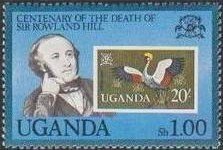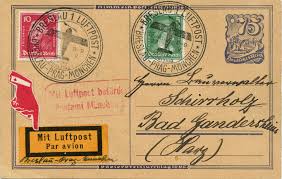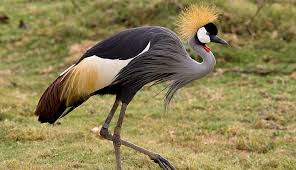Stamp: Death Centenaryof Sir Rowland Hill & Stamp MiNr. 100 (Uganda 1979)
Death Centenaryof Sir Rowland Hill & Stamp MiNr. 100 (Uganda 1979)
01 October (Uganda ) within release 100th Anniversary of Death Rowland Hill goes into circulation Stamp Death Centenaryof Sir Rowland Hill & Stamp MiNr. 100 face value 1 Ugandan shilling
| Stamp Death Centenaryof Sir Rowland Hill & Stamp MiNr. 100 in catalogues | |
|---|---|
| Michel: | Mi:UG 254 |
Stamp is square format.
Also in the issue 100th Anniversary of Death Rowland Hill:
- Stamp - Death Centenaryof Sir Rowland Hill & Stamp MiNr. 100 face value 1;
- Stamp - Sir Rowland Hill & Stamp MiNr. 102 face value 1.50;
- Stamp - Sir Rowland Hill & Stamp MiNr. 84 face value 2.70;
Stamp Death Centenaryof Sir Rowland Hill & Stamp MiNr. 100 it reflects the thematic directions:
The mail or post is a system for physically transporting documents and other small packages; or, the postcards, letters, and parcels themselves. A postal service can be private or public, though many governments place restrictions on private systems. Since the mid-19th century national postal systems have generally been established as government monopolies with a fee on the article prepaid. Proof of payment is often in the form of adhesive postage stamps, but postage meters are also used for bulk mailing. Modern private postal systems are typically distinguished from national postal agencies by the names "courier" or "delivery service". Postal authorities often have functions other than transporting letters. In some countries, a postal, telegraph and telephone (PTT) service oversees the postal system, in addition to telephone and telegraph systems. Some countries' postal systems allow for savings accounts and handle applications for passports.
Birds (Aves), a subgroup of Reptiles, are the last living examples of Dinosaurs. They are a group of endothermic vertebrates, characterised by feathers, toothless beaked jaws, the laying of hard-shelled eggs, a high metabolic rate, a four-chambered heart, and a strong yet lightweight skeleton. Birds live worldwide and range in size from the 5 cm (2 in) bee hummingbird to the 2.75 m (9 ft) ostrich. They rank as the class of tetrapods with the most living species, at approximately ten thousand, with more than half of these being passerines, sometimes known as perching birds. Birds are the closest living relatives of crocodilians.
Postal history is the study of postal systems and how they operate and, or, the study of the use of postage stamps and covers and associated postal artifacts illustrating historical episodes in the development of postal systems. The term is attributed to Robson Lowe, a professional philatelist, stamp dealer and stamp auctioneer, who made the first organised study of the subject in the 1930s and described philatelists as "students of science", but postal historians as "students of humanity". More precisely, philatelists describe postal history as the study of rates, routes, markings, and means (of transport).
Animals are multicellular, eukaryotic organisms of the kingdom Animalia (also called Metazoa). All animals are motile, meaning they can move spontaneously and independently, at some point in their lives. Their body plan eventually becomes fixed as they develop, although some undergo a process of metamorphosis later on in their lives. All animals are heterotrophs: they must ingest other organisms or their products for sustenance.
Cranes are a type of large bird with long legs and necks in the biological family Gruidae of the order Gruiformes. The family has 15 species placed in four genera which are Antigone, Balearica, Leucogeranus, and Grus. They are large birds with long necks and legs, a tapering form, and long secondary feathers on the wing that project over the tail. Most species have muted gray or white plumages, marked with black, and red bare patches on the face, but the crowned cranes of the genus Balearica have vibrantly-coloured wings and golden "crowns" of feathers. Cranes fly with their necks extended outwards instead of bent into an S-shape and their long legs outstretched.





